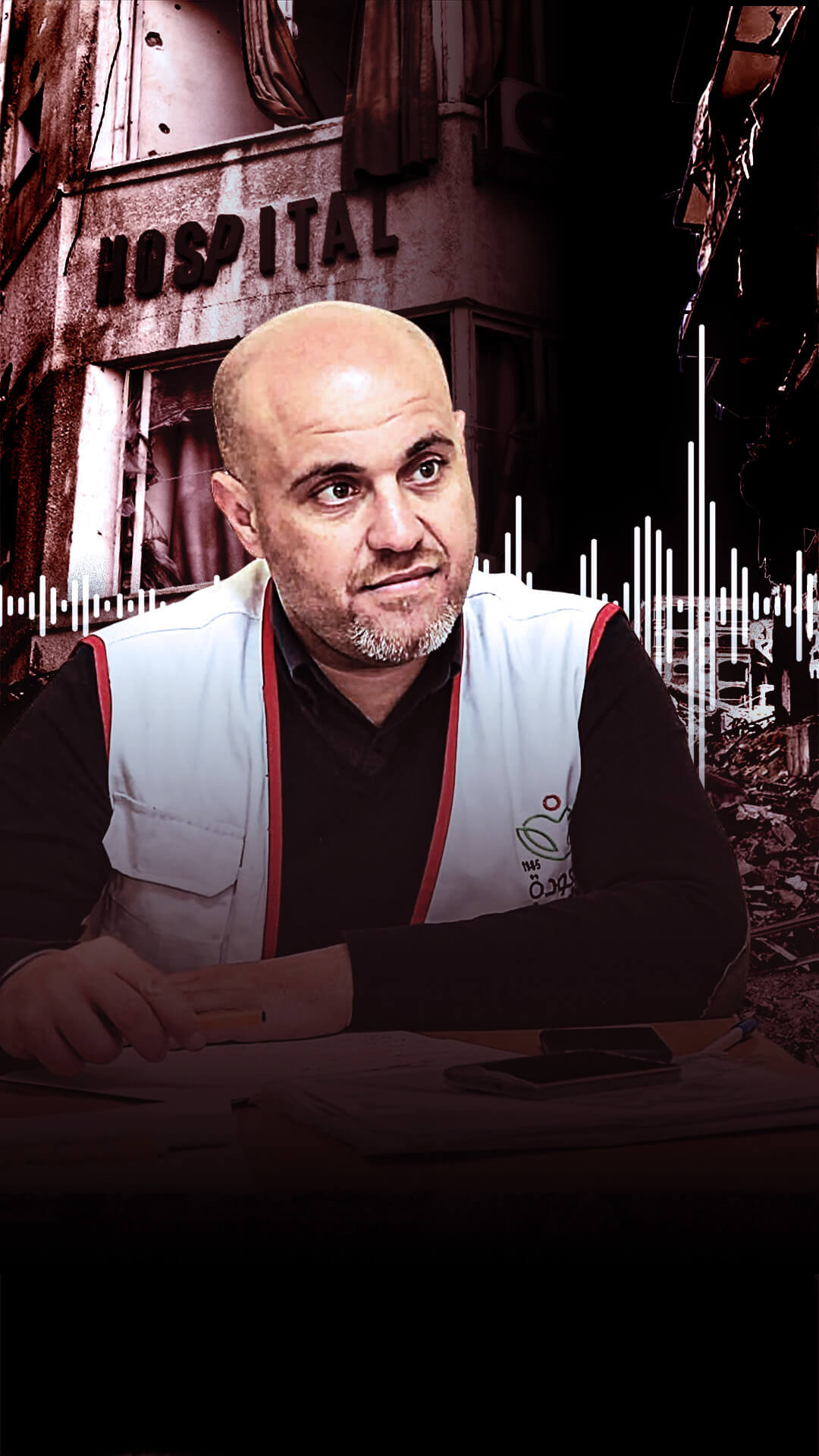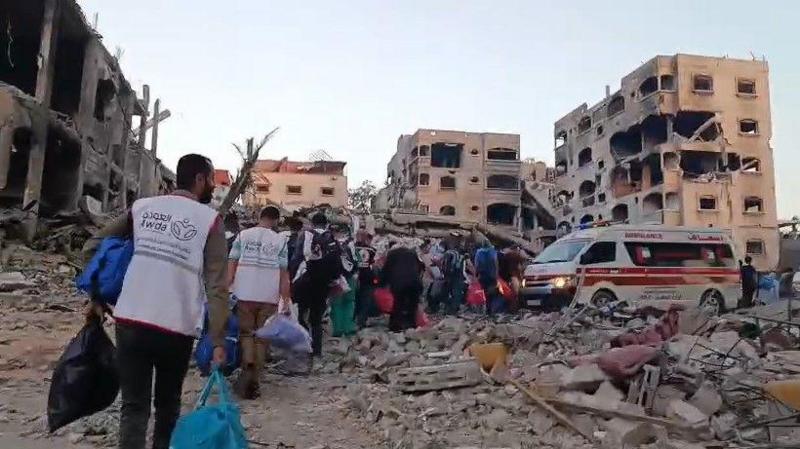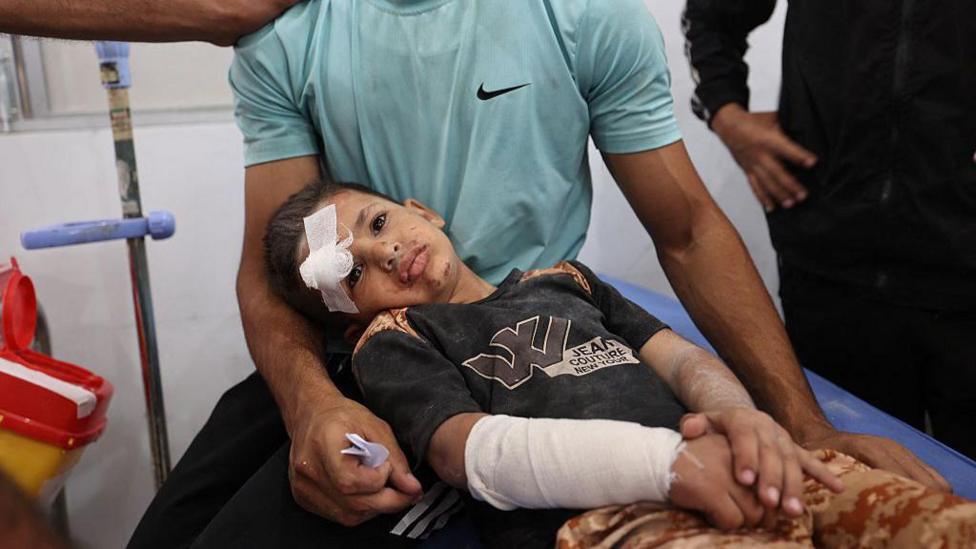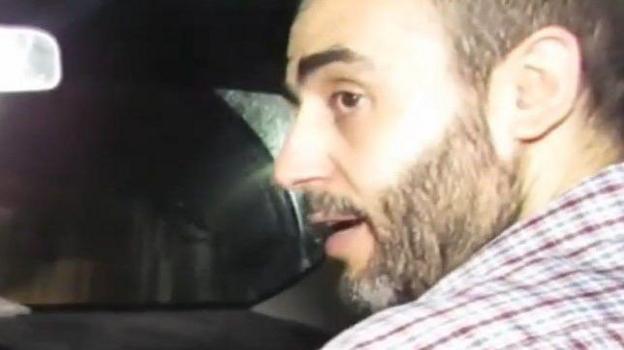“They are shooting a lot. The tank has sieged the hospital.”
Gunfire can be heard in the background of a hushed voice note sent in the middle of the night from inside al-Awda hospital, described by the World Health Organization last month as the “last functioning hospital in North Gaza”.
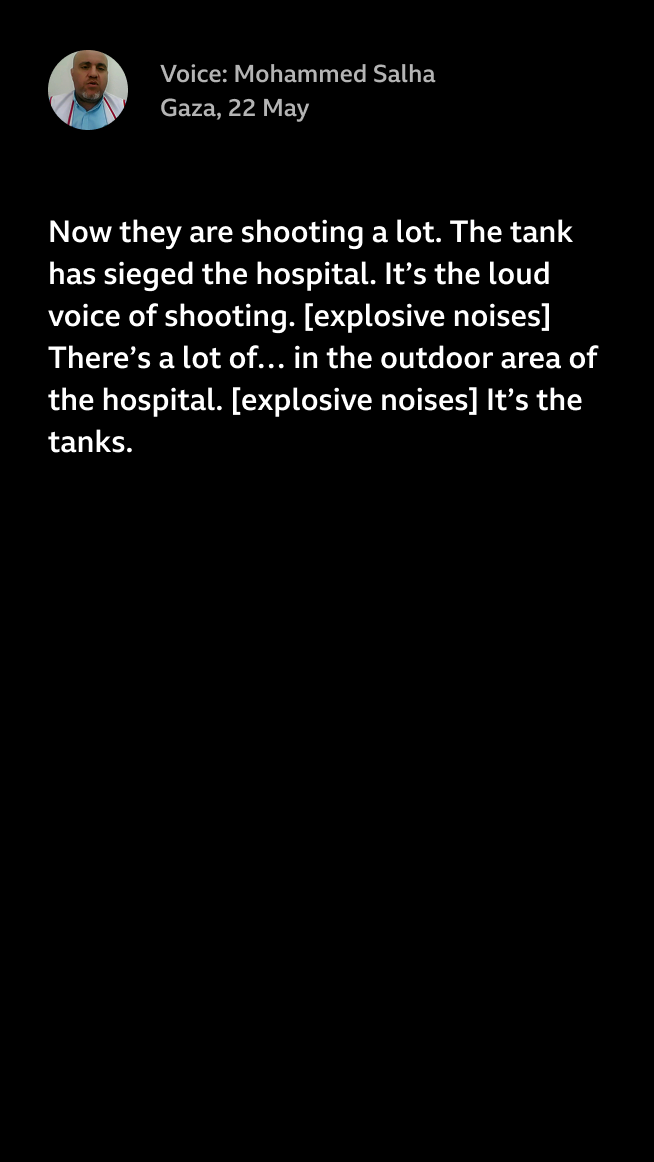
A week later, the hospital was declared out of service and the medical staff, including the director, Mohammed Salha, who recorded the voice note, were forced to evacuate and head south.
Patients were carried on stretchers and wheelchairs past mounds of rubble and bombed-out buildings to waiting ambulances.
With fewer than half of Gaza’s hospitals now running - and those that are only at a limited capacity - there are warnings from groups like the WHO and British Red Cross that the health system is being “systematically dismantled” and "on the brink of collapse", as the number of casualties from the 20-month war continues to rise.
Al-Awda in northern Gaza is one of several hospitals across the territory to have ceased or reduced operations since Israel expanded its offensive last month, with the Israeli military accusing Hamas and other armed groups of operating in and around the facilities.
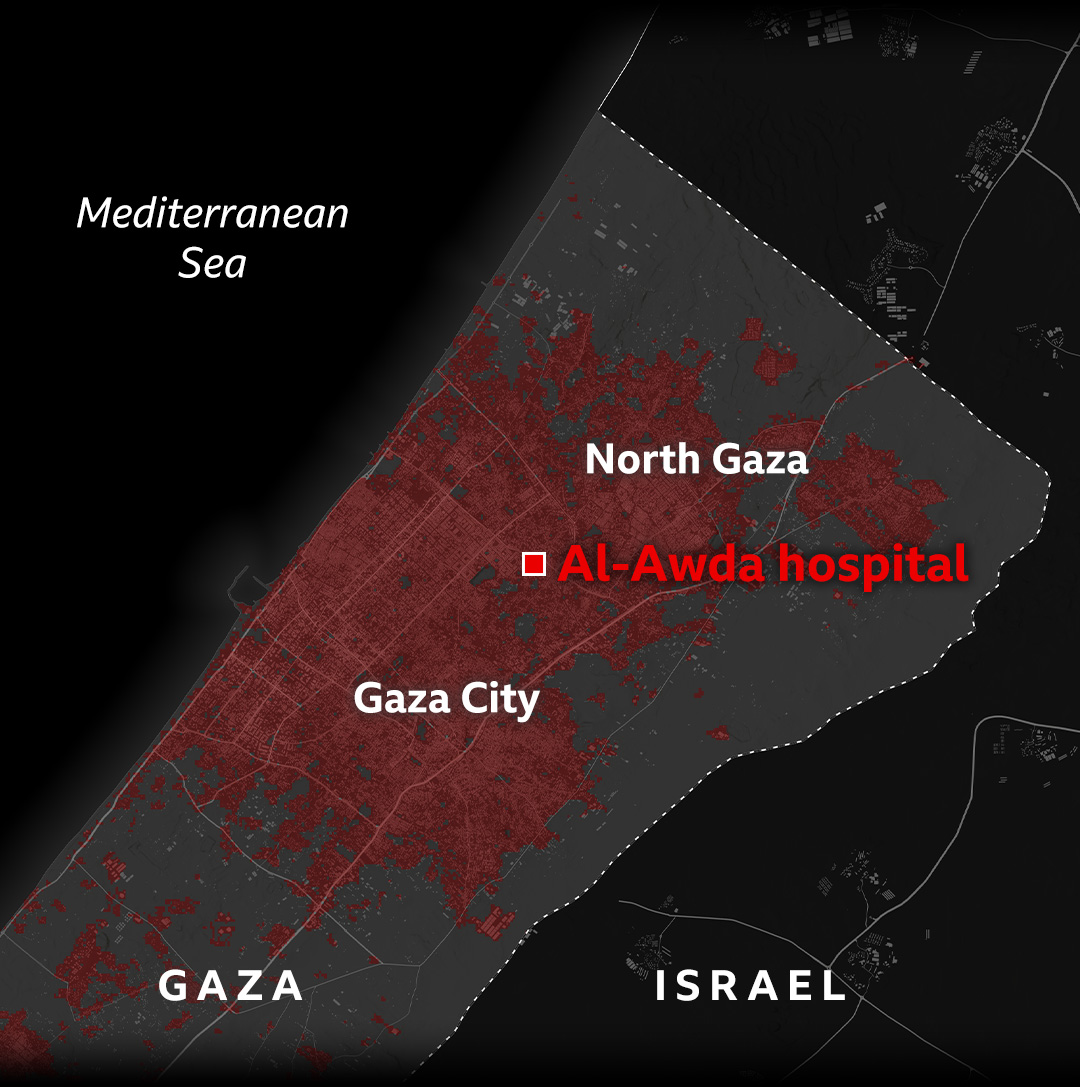
Over a period of two weeks, Salha sent regular voice notes to the BBC from inside the hospital, including at times when it could not be reached by patients or journalists, tracking its rapid deterioration until the moment it shut down completely.
We have corroborated key details with others’ testimony, including two medics who were inside the hospital at the time, as well as video and photo evidence that we have verified, and sent multiple enquiries to the Israeli military.
This is an account of one hospital’s final days.

The NGO-run al-Awda hospital is located in the northern Gaza town of Jabalia. It is supported by international groups including Action Aid and Relief International with the help of EU funding.
Overnight and in the morning the hospital receives “more than 97” patients injured by Israeli bombing, Salha says by voice note. The emergency room has only 12 beds.
Video footage later verified by the BBC shows an injured man being brought to al-Awda in a rickshaw, with a bandage and belt tied around his leg, and carried inside.
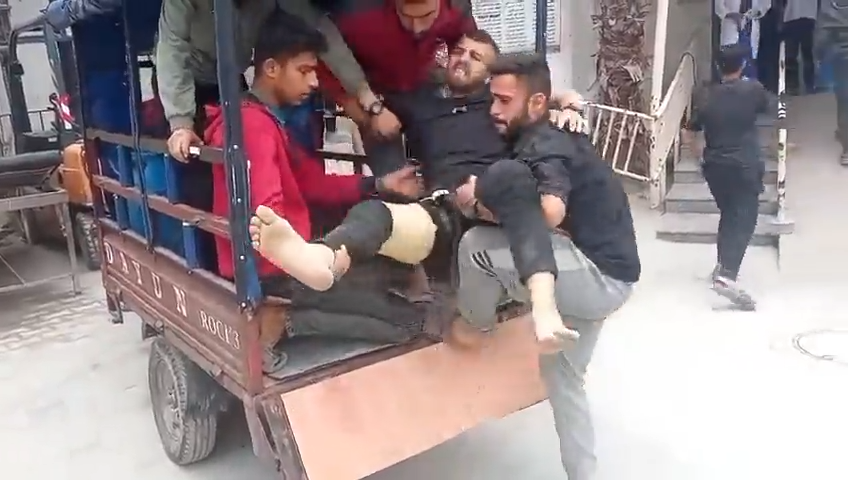
Among six bodies that arrive are Salha’s eight-year-old nephew Jamal and nieces Fatima and Hanadi, aged 10 and 28, Salha says. The two children had been sleeping at a nearby home in the neighbourhood of Tal al-Zaatar, when an Israeli strike hit leaving them under rubble for more than five hours before rescuers could retrieve their bodies, he says.
The strike on the home is reported by a local journalist, and an al-Awda hospital staff member says in a WhatsApp group seen by the BBC that children’s bodies were brought to the hospital that day.
The Israel Defense Forces (IDF), when provided with the street, timeframe and name of the family living in the building hit, said it needed more specific details before it could respond to questions on the strike.
On the same day, the United Nations releases a statement saying the reported killing of “at least 45 children in the Gaza Strip in the last two days is yet another devastating reminder that children in Gaza are suffering first and foremost, having to starve day after day only to be victims of indiscriminate attacks”.
A life-saving operation is performed on the children’s mother who has shrapnel in her liver, Salha says.
The director’s grieving relatives shout and cry in the hospital. He shuts himself in his office briefly to cry alone, before returning to work.
“Also, there is news that Israeli forces will enter the north.”
The Israeli military later confirms it has begun “part of the opening moves" of its expanded military offensive Operation Gideon’s Chariot, launching “extensive attacks” aimed at defeating Hamas and bringing home the hostages still held in Gaza.
Salha says the hospital is running on a small generator and is also struggling to deal with the effects of a total Israeli blockade now in its 10th week, causing shortages of medical supplies and fuel.
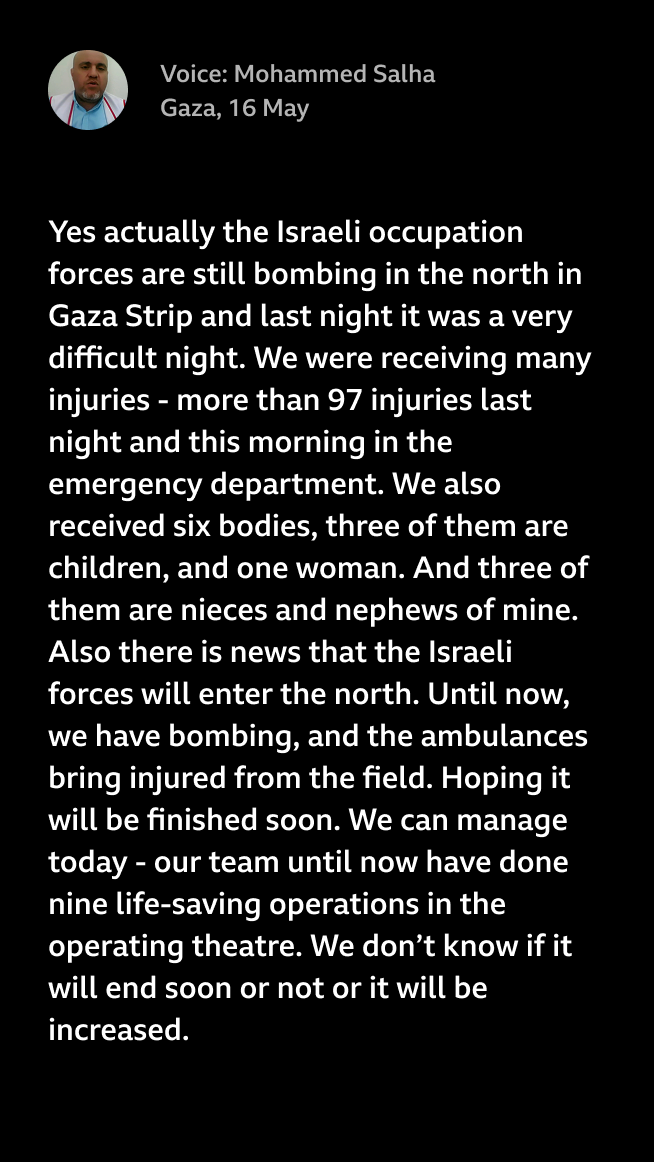
Israeli ministers have described the blockade as one of the “main pressure tools” to secure victory over Hamas, which they accuse of stealing aid and profiting from it.
“Hoping it will be finished soon,” says Salha. “We can manage today.”

The situation worsens at al-Awda, as the Israeli military continues its ground operations and strikes “terror targets” across Gaza.
Overnight, Israeli forces bombed nearby houses and the surroundings of the hospital, says Salha, causing damage to windows, doors, floors and ceilings - as well as the gas, water and electricity network.
A post on the hospital’s Facebook page in the morning refers to a “harsh night”, with damage caused by shelling in the immediate vicinity. Photos show damaged ceilings and walls and dust covering ambulances in the courtyard.
In a video shared overnight on social media and verified by the BBC, an explosion close to the hospital fills the courtyard with smoke and sends people scrambling into al-Awda.
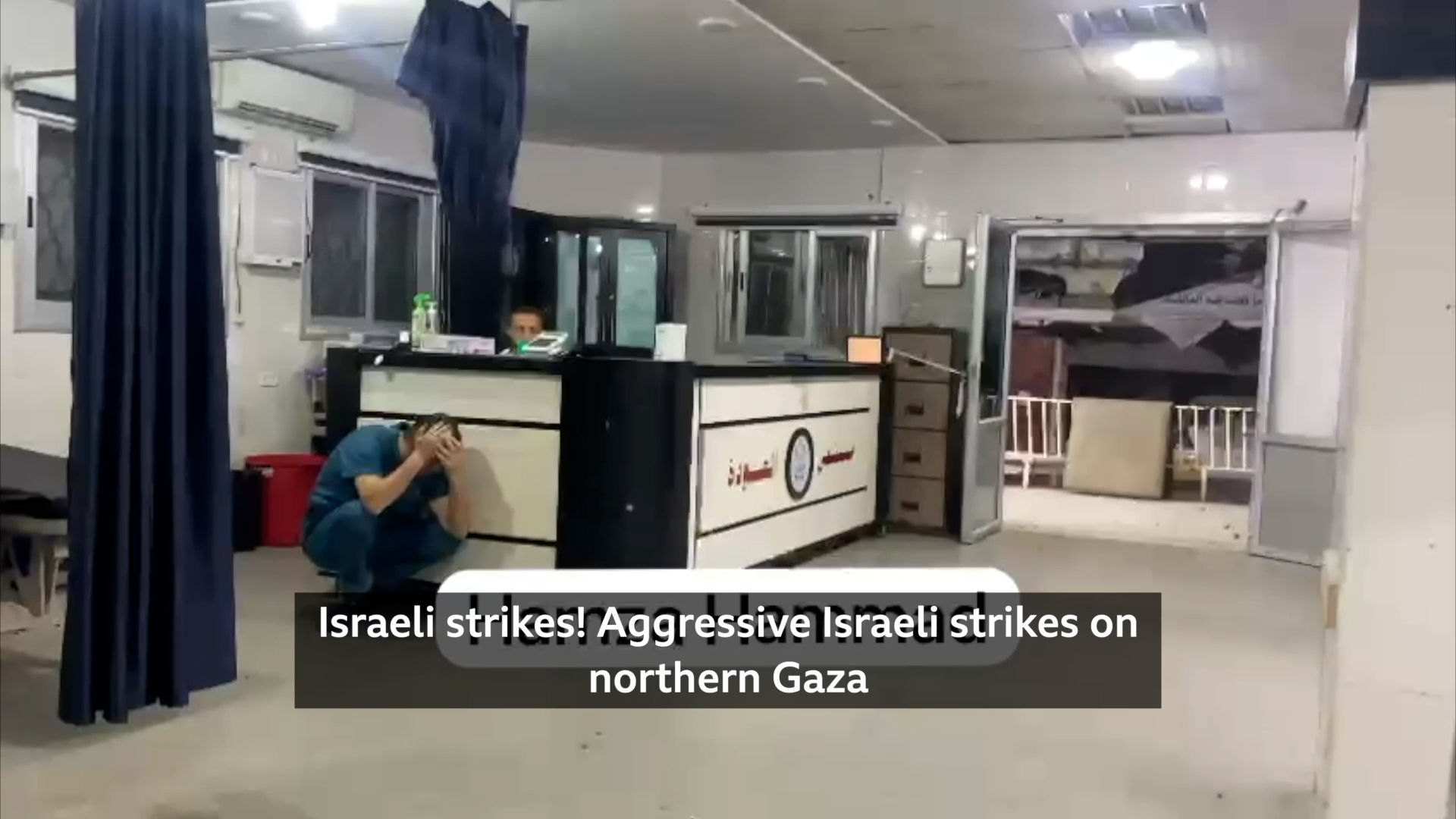
In a statement the following day, the United Nations Office for the Coordination of Humanitarian Affairs (Ocha) also says al-Awda “was struck, putting scores of patients and medical staff at risk”.
The nearby Indonesian Hospital is declared out of service by Gaza’s Hamas-run health ministry, following what the UN later describes as “repeated Israeli attacks and sustained structural damage”. The IDF says it was fighting “terrorist infrastructure sites” in the area.
Israel does not allow international journalists access to Gaza, and the situation around the hospitals in the far north of the strip makes it too dangerous for the trusted freelancers the BBC works with to go there.
Al-Awda fills its oxygen cylinders at the Indonesian, Salha says, so if it runs out of oxygen now it will become “impossible to work”. Al-Awda also relies on the Indonesian for its intensive care unit.
“If we have ICU cases now we’ll have to refer them to Gaza City and we don’t know if it’ll be possible to go because the situation outside is dangerous to move between hospitals,” he says.
Another nearby hospital, Kamal Adwan, is also classified as out of service, though tents have been erected there to offer some care.
Salha fears what might happen if al-Awda has to shut - especially because of its maternity services. “If there is no al-Awda hospital… women will give birth in the street.”
At this point, al-Awda is considered the last functioning hospital in Gaza’s northern governorate, which does not include Gaza City.
Despite being declared out of service several times during the war, staff say it continued to operate at some level throughout, including after its previous director was detained by Israeli forces in December 2023.
The IDF told the BBC it was unable to confirm details of his detention or any charges unless his ID number was supplied. The WHO says 300 health workers have been detained in Gaza since October 2023.
Asked after al-Awda’s eventual closure if there was any evidence of Hamas or other groups’ activity there, the IDF said Hamas had a strategy of using hospitals for “terror-related activities”, including holding hostages, storing explosives and sheltering senior operatives, referring to allegations related to several other hospitals across Gaza.
Last month, the Israeli military killed Mohammed Sinwar, Hamas’ military leader, later saying his body was discovered in a tunnel underneath the European Hospital in southern Gaza.
Asked twice more if there was any evidence of armed groups operating in al-Awda, the IDF gave no comment.

Salha says that after his last message, the internet services have gone down, meaning he is now relying on data from an eSIM.
“The situation this morning is less than the situation yesterday…. The drones and quadcopters are shooting but the [frequency] is not like yesterday.”
He says two women gave birth at the hospital yesterday, but no one had arrived this morning “maybe because of the dangerous situation surrounding the hospital”.

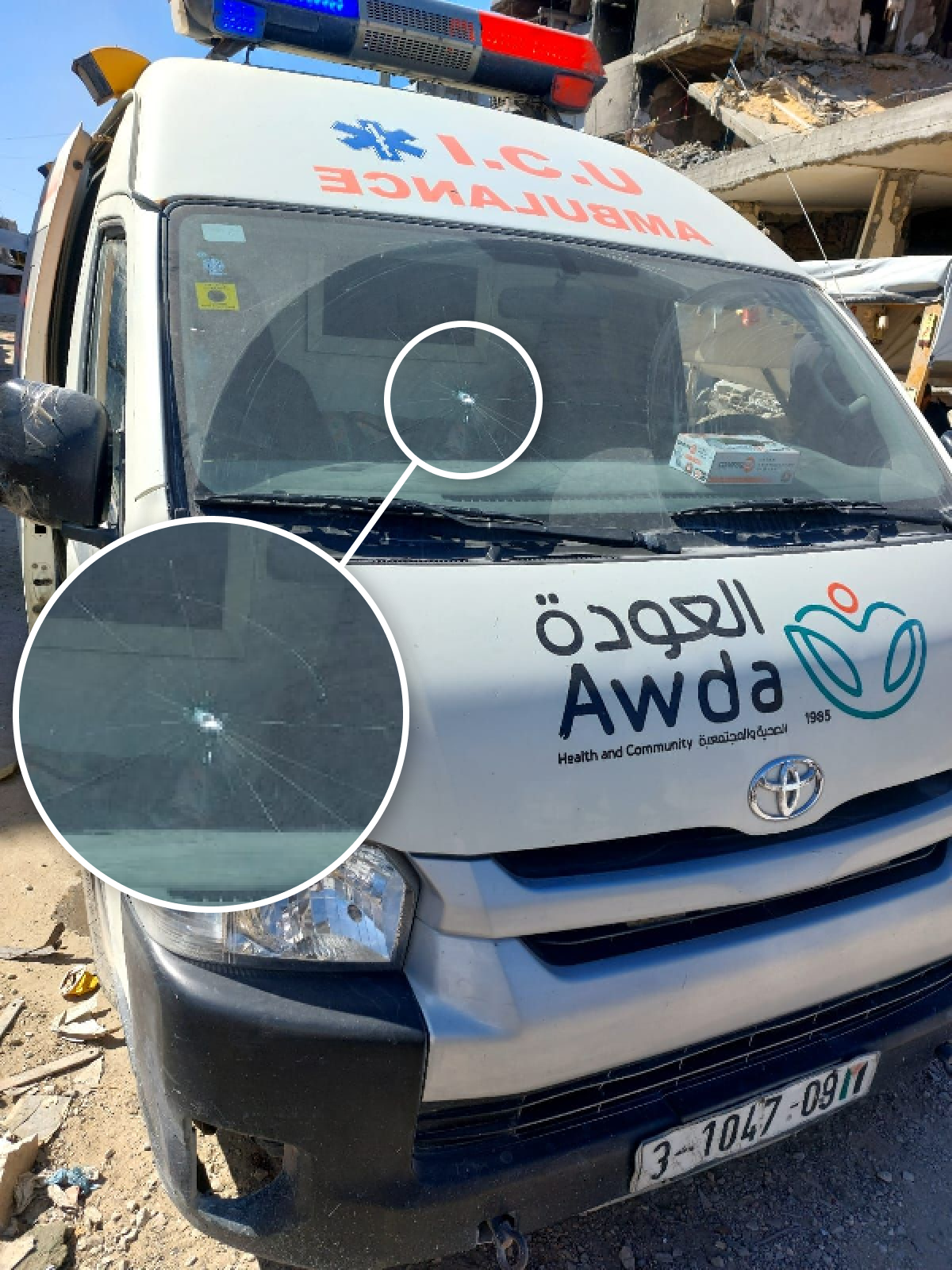
Ambulances have been shot at and the drivers are stuck, Salha says.
He puts the BBC in contact with a paramedic and driver who says his ambulance has been shot by an Israeli drone while he was transporting staff and food between al-Awda and Kamal Adwan hospitals. No one is injured.
Photos verified by the BBC show an al-Awda ambulance outside the main building of Kamal Adwan, on the main road to al-Awda, with damage to the windscreen.
The BBC later sends photos to a munitions expert, who says the damage would be consistent with a small calibre projectile or high-velocity debris impact.
The BBC also sends details of the allegations and photos to the IDF, which says after several hours it "could not confirm" the reports.
On the same day, an evacuation order covers al-Awda as well as the nearby Indonesian and Kamal Adwan hospitals.
WHO chief Dr Tedros Adhanom Ghebreyesus warns that intensified Israeli ground operations and new evacuation orders are “stretching the health system beyond the breaking point”.

“Good morning,” says Salha, with a deep sigh. “Now, the hospital is totally under siege.”
No-one can leave and they cannot receive any patients because “a quadcopter drone… is shooting in the surroundings of the hospital and the outdoor area of the hospital,” he says.
“I think we hear shooting from the tanks. It’s not close but I think at least 400-500 metres [away]…”
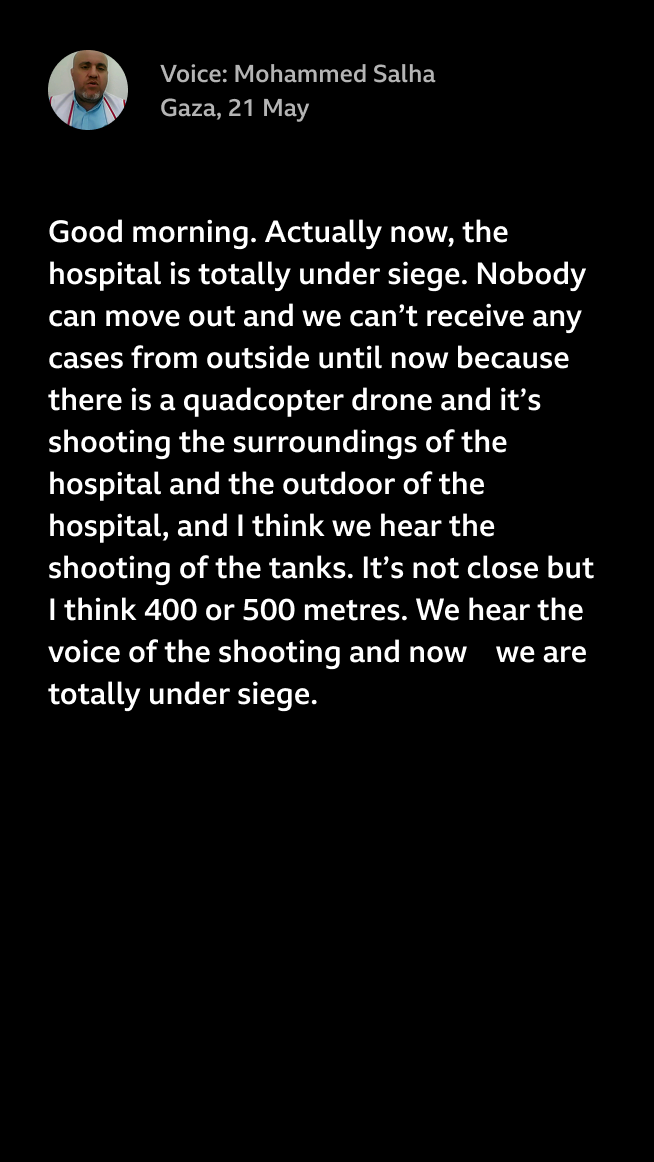
The voice note eventually cuts out. The conversation continues over message.
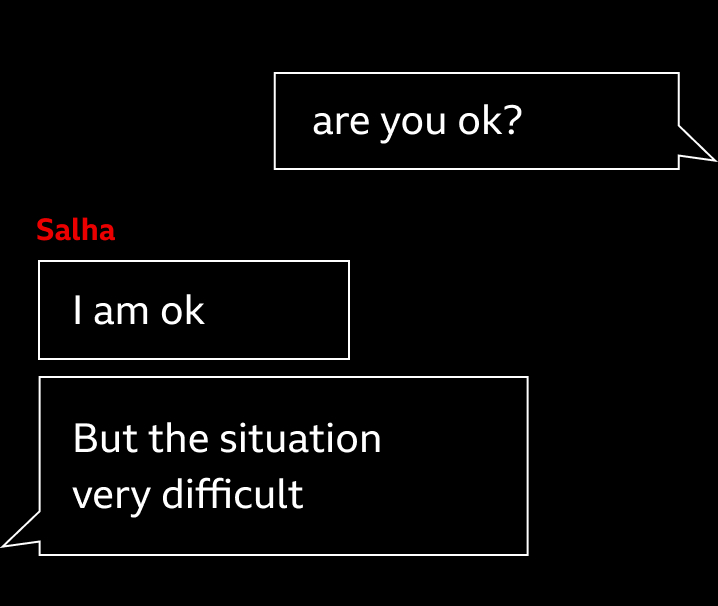

He responds again at around 02:00, when he says by message the situation has escalated further, with the third floor being bombed.
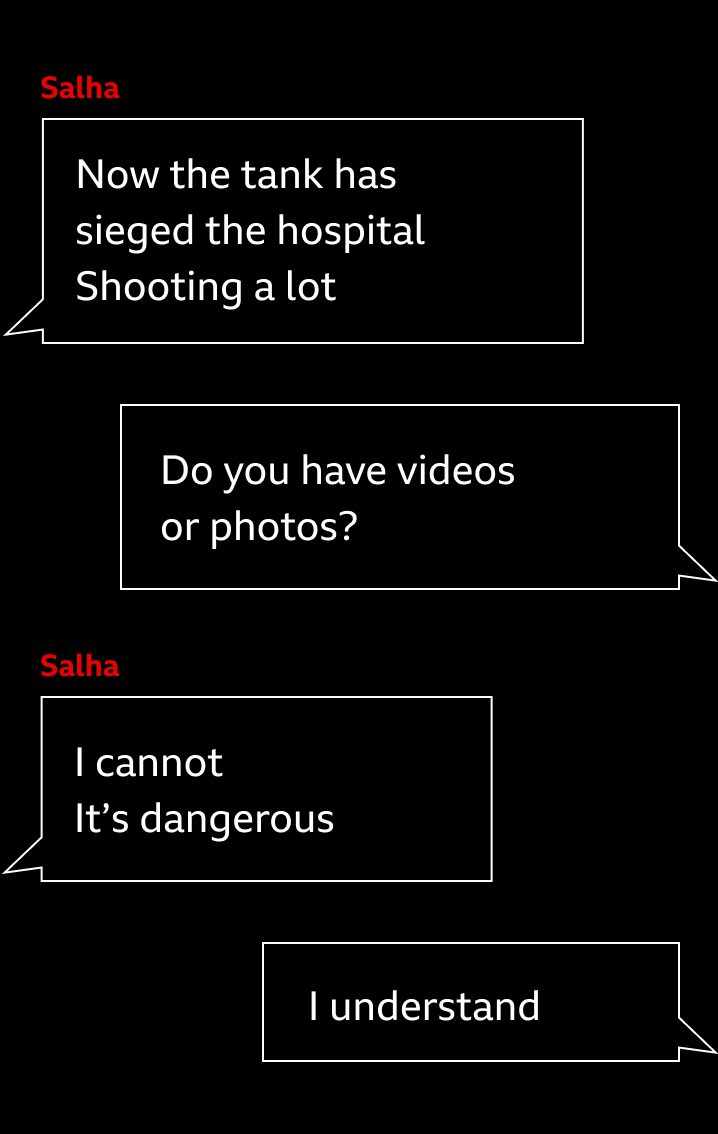
The messages again stop for several hours, until two voice notes arrive at around 07:30 - delayed by connectivity issues. Salha speaks in a steady voice as gunfire sounds in the background.
“It’s the loud voice of shooting,” he says.
The BBC later sends the audio to multiple experts, who say you can hear small arms fire, with several suggesting it is indicative of mounted guns on Israeli tanks. They say it is not possible to determine definitively whether it indicates a gun battle or only one side firing.
Analysts at Janes, an open-source defence and security intelligence company, say the “pitch and echo of the fire” indicates that it is happening in “close terrain”.

In a message later in the day, Salha says it was a “really, really difficult night”.
He says from 00:30 to 03:00, tanks fired at hospital buildings and at its third floor, hitting the inpatient unit for specialist surgery.
Tents used as an orthopaedic clinic, and for women and children who have suffered gender-based violence, have caught alight, he says.
The fire has spread downstairs - where medication and medical supplies are stored - and it’s still burning as he sends the voice note, he says, adding that he fears the fire could spread to fuel reserves and the hospital generator, risking a huge explosion.
Footage of the fire recorded that day is later verified by the BBC showing it in a building in the hospital’s courtyard - some 50m from the main entrance.
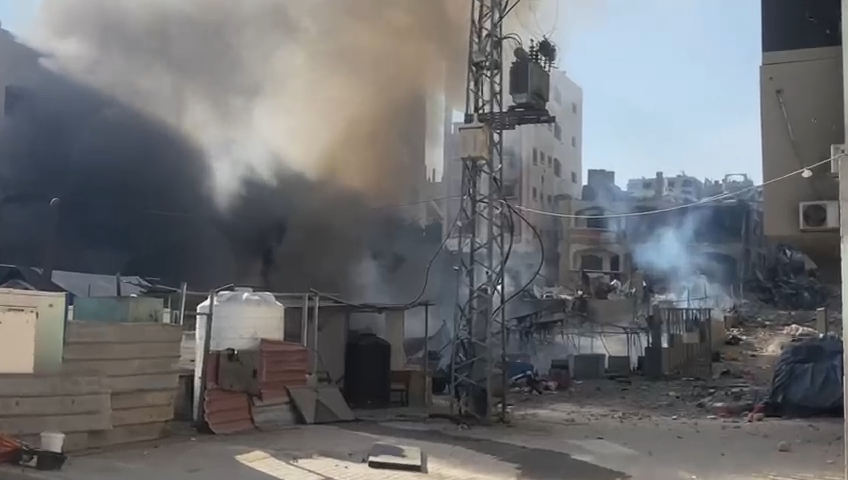
Other verified footage shot in the courtyard shows damage to the hospital’s third floor, with an 8m x 2m section of the facade torn from the building. It isn’t possible to verify when exactly the damage was caused.

Salha - who is the hospital’s key point of contact with the IDF - says he’s trying to "call for coordination with the Israelis, but there is no answer".
Communication with the Israeli military usually happens over Arabic-language phone calls with a man he believes is in Israel, he later explains.
The WHO also shares reports of the third floor being hit, and confirms that “patient triage tents”, including one it provided, have caught fire, and that medical supplies and vehicles have been destroyed.
It says a WHO mission to reach the hospital was “impeded” without giving further details.
Al-Awda partner Action Aid also releases a statement saying it was “horrified to learn” that the hospital “has yet again come under intense attack by the Israeli military”.
“In the last 24 hours, staff report that tank fire has hit the hospital’s surgery department, water tanks, fuel tanks and outpatient building,” it says.
Asked about what is happening at the hospital, the IDF tells the BBC it has been operating “in the area adjacent” to al-Awda against “terror targets”.
“The IDF is aware of the claim of a fire breaking out in the area of the hospital. No injuries were reported. The IDF allowed the arrival of local firefighting forces to extinguish the fires. The circumstances of the fire are still under review,” it says.
“We emphasise that the IDF enables coordination for the evacuation of patients from the hospital via secure and designated routes.”
Asked about the reported bombing of the hospital’s third floor, the IDF later tells the BBC it is “not aware” of an artillery strike on al-Awda on either 21 or 22 May.

A WhatsApp message to Salha on 23 May went unanswered, remaining on one tick on WhatsApp for much of the day. But the following day a voice note arrives.
He says Israeli forces had hit the hospital again yesterday, with three staff sustaining shrapnel injuries while they were in the emergency room. One is badly hurt and doctors are carrying out life-saving operations, he says.
He later tells the BBC that staff were injured with shrapnel in the chest, hand and leg. He does not give the names of the medical staff, who fear for their safety.
Relief International also later refers to reports of staff being injured after the emergency room was hit.
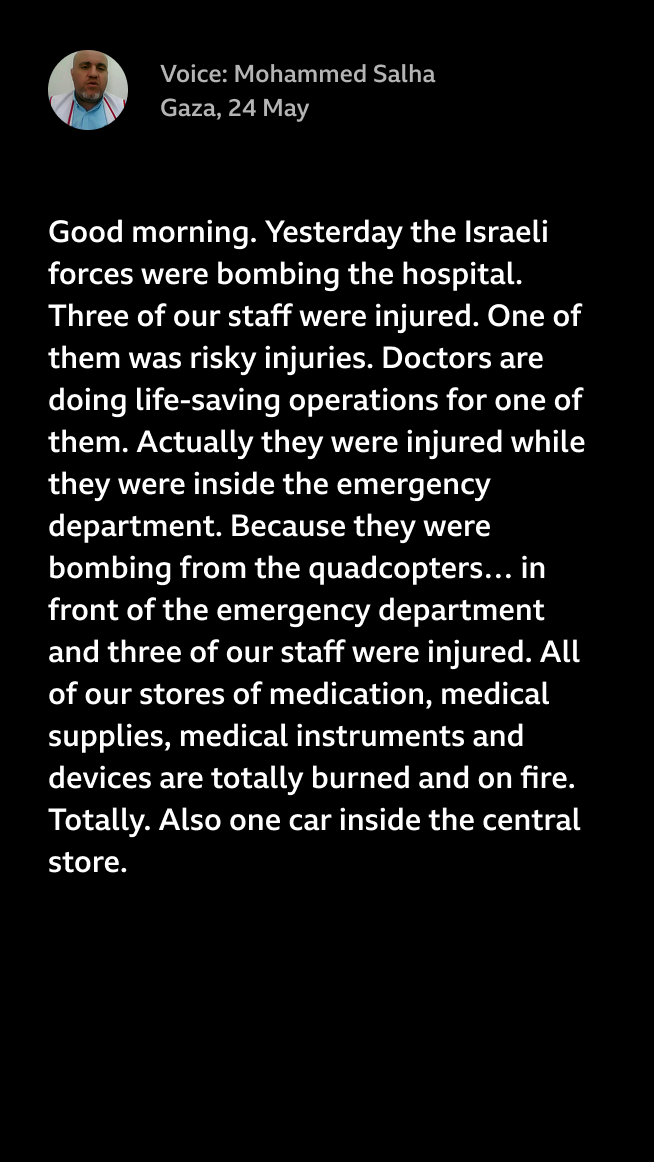
In response to questions about this incident, the IDF later tells the BBC it is “not aware of a strike” on this date.
The fires have now been brought under control, Salha confirms, but he says reserves of medicine, medical supplies, medical instruments and devices have been burned.
The conversation again moves to message.
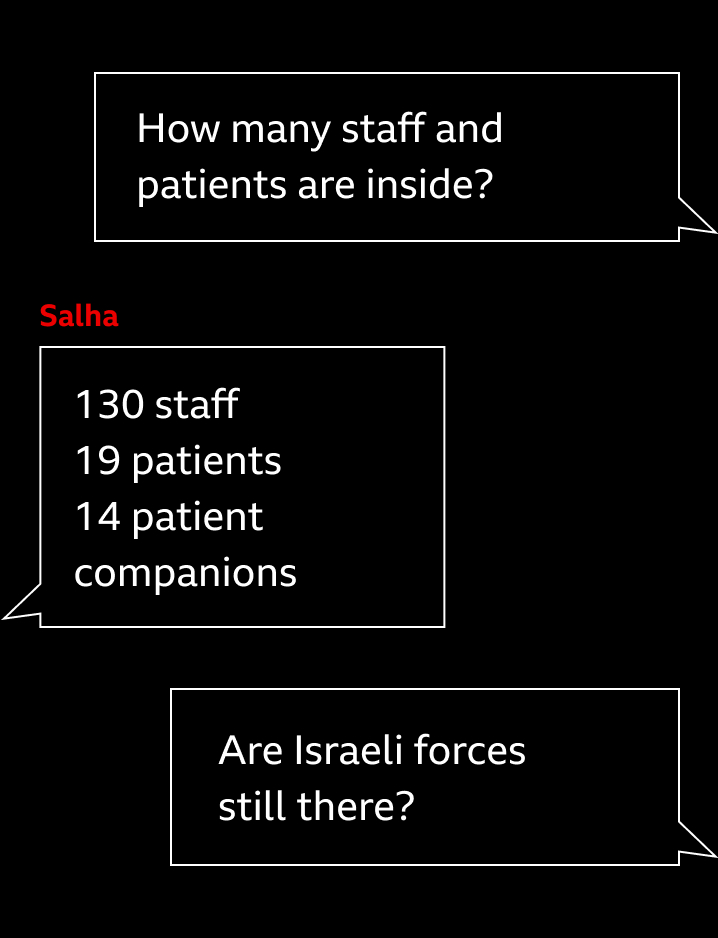
Salha does not respond.

For several days, no messages arrive.
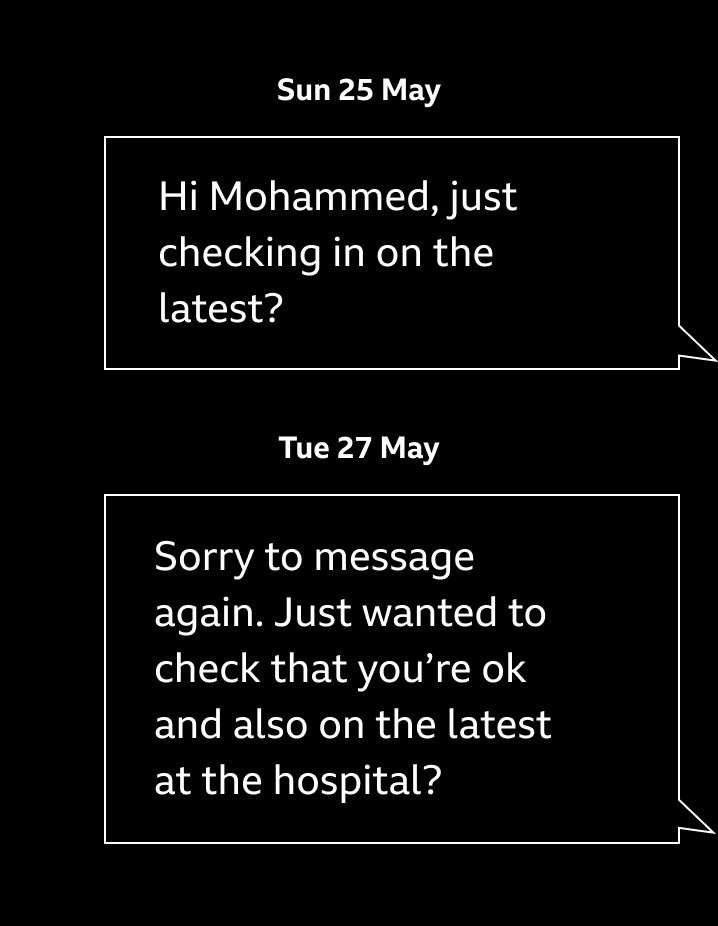
Then, an update in a WhatsApp group with other journalists. Some patients have been evacuated along with dozens of staff, Salha says.
His sister-in-law - injured in the strike which killed her children - is among them. She needs a CT scan, he says.
Eighty-two staff members remain at the hospital, the director says, as well as 11 patients and “patient companions”.
The WHO says its team was “exposed to nearby airstrikes, shelling and gunfire” while assisting with two rounds of evacuations at al-Awda.
It says among the people it evacuated were three members of staff “injured during the 23 May attack”.
It describes al-Awda as “minimally functional and critically low on medicines”, adding that “access is severely restricted due to continued hostilities in the area”.
“Al-Awda must be protected. It is the last remaining lifeline for health in North Gaza,” it says.
Asked to describe the state of al-Awda during the evacuations, a man who joined the effort later tells the BBC by WhatsApp message from Gaza: “Barely functional. They still had water and food.”
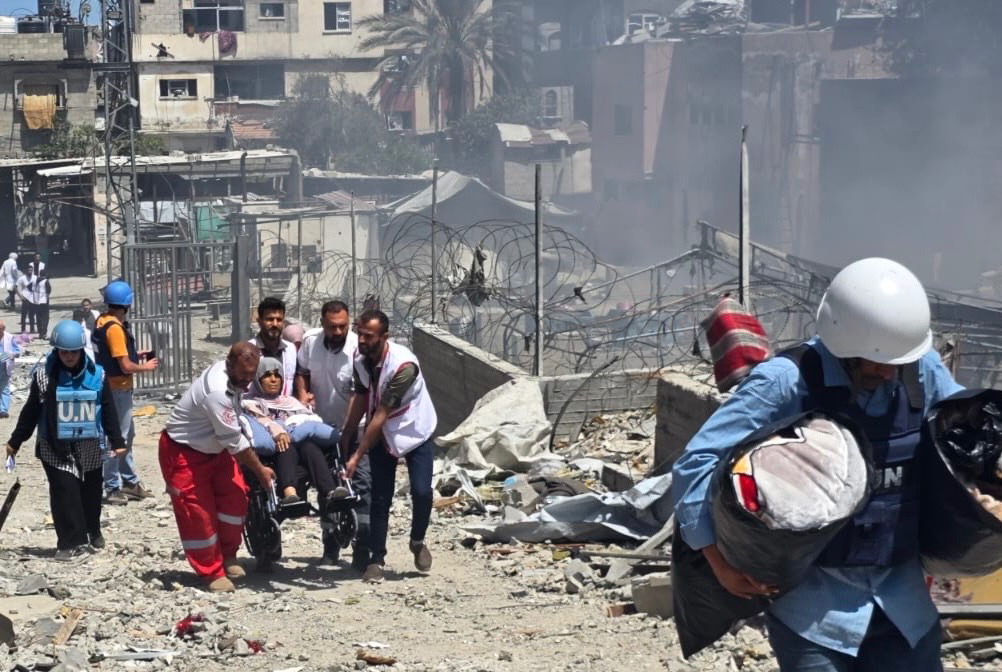
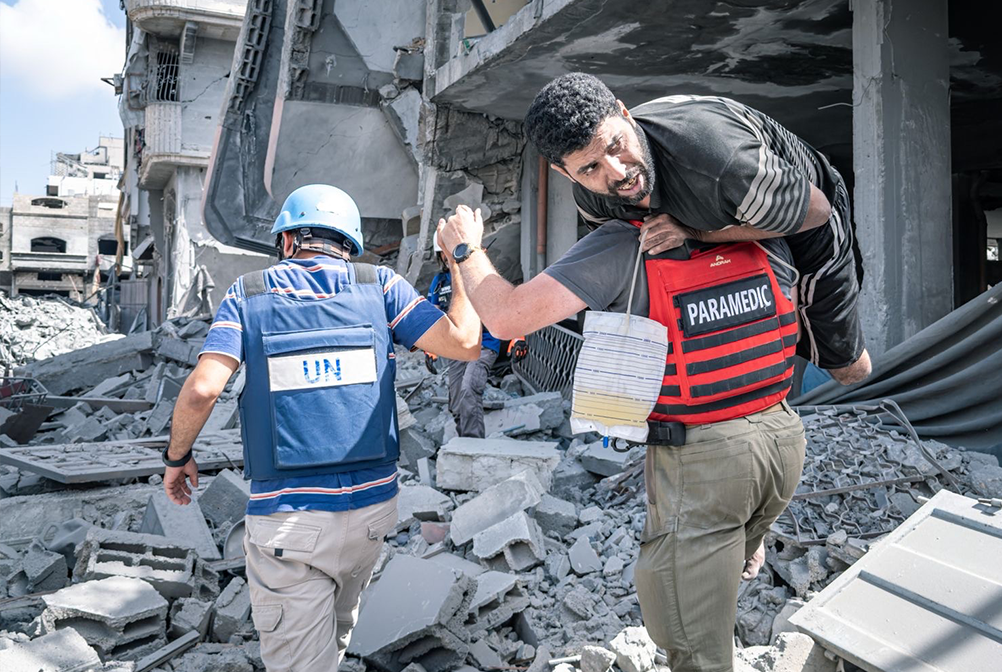

A direct message finally arrives. “I’m sorry for the delay but the past few days have been very difficult days,” Salha says, his voice heavy and dejected.
The hospital is facing “a lot of bombing and shooting from the tanks... and they forced us to evacuate the hospital”.
In a second voice note sent later with more details of the evacuation, he says he initially refused to leave, asking if a limited team can stay on with patients, but he says the IDF refuse.
He says the Israeli army threatened to enter the hospital and kill everyone inside if they do not evacuate. The IDF later denies it threatened hospital staff - saying it let them evacuate “if they wished”, given the hospital’s location in the centre of a combat zone “adjacent to terror infrastructure”.
All remaining staff and patients leave, Salha says, with some patients carried up to 300 metres because ambulances are so far away, and roads are destroyed.
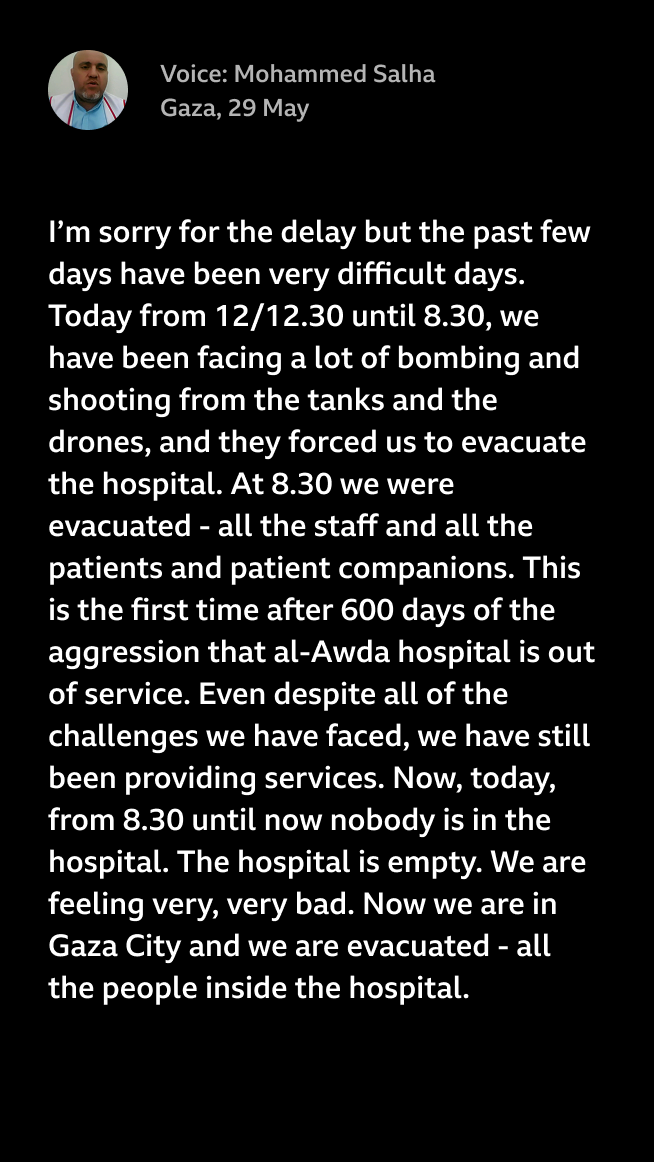
Videos verified by the BBC show patients and staff being moved to Gaza City. In one, staff, including Salha (seen in the video below wearing a green top, white vest and a black backpack), can be seen walking along a rubble-strewn road at sunset towards waiting ambulances and a lorry.
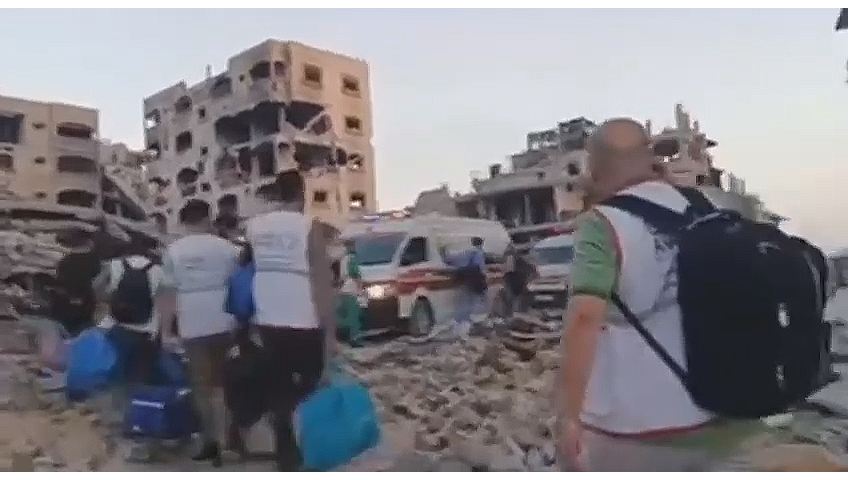
“With al-Awda’s closure, there is no remaining functional hospital in North Gaza - severing a critical lifeline for the people there,” the WHO says in a statement shared on X.
Relief International later says the hospital was “issued forced displacement orders and directly targeted by Israeli forces”, with staff and remaining patients “left with no option but to evacuate under the threat of guns”.
“This new forced transfer took place with very little advance notice and in extremely challenging circumstances – given the condition of the roads, the lack of means, and the complete exhaustion following a two-week siege on the hospital,” it said.
The BBC asks the IDF what is happening. More than 40 hours later it says it had “enabled” the evacuation of medical staff and patients “following the identification of terrorist activity and terrorists who had planted explosives in the area of al-Awda”.
“The evacuation was carried out in coordination with the health authorities, via designated evacuation routes and using ambulances, to other hospitals in the Gaza Strip, in order to ensure the continued medical treatment,” it says.
Salha says the closure of al-Awda marks the first time in the war it has fully ceased operations.
“Despite all of the challenges we faced,” he says, “we had still been providing services”.
“Today, from 20:30, nobody is in the hospital. Al-Awda is empty.”
“We are feeling very, very bad.”

In a new message sent on 17 June, Salha says he has been permitted by the Israeli military to return to al-Awda hospital to collect some of the medical equipment, medication and fuel there. He says he found a lot of damage around and inside the hospital, including destroyed windows, doors, ceilings and water tanks that had been repaired during the ceasefire.
But, he says, the hospital was still standing when he visited.
"We hope it [the war] finishes soon so we can go back," he says.
Credits
Additional reporting: Malaak Hassouneh. Production and design: Visual journalism team with So Dam Jung. Verification of footage, images and locations: Richard Irvine-Brown, Joshua Cheetham and Benedict Garman, BBC Verify.
Notes
Damage analysis of Copernicus Sentinel-1 satellite data by Corey Scher of CUNY Graduate Center and Jamon Van Den Hoek of Oregon State University, UN Ocha, OpenStreetMap, European Commission GHSL
